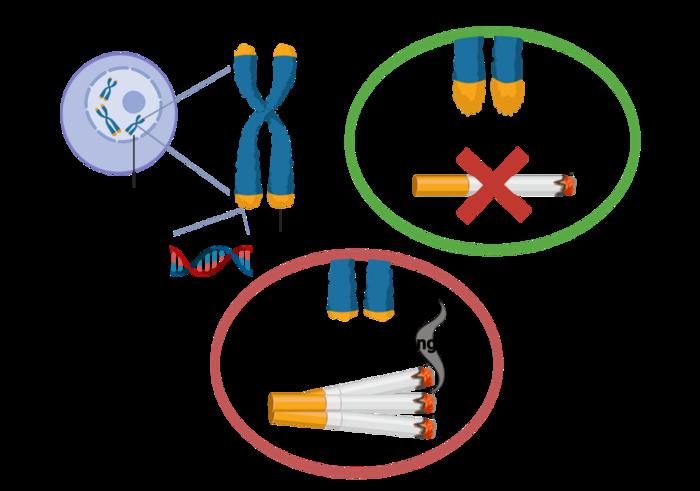Milan, Italy: A study of nearly 500,000 people has shown that smoking shortens the end fragments of chromosomes in the white blood cells of our immune systems. The length of these end fragments, called telomeres, is an indicator of how quickly we age and our cells’ ability to repair and regenerate.

Credit: Credit Dr Siyu Dai
Milan, Italy: A study of nearly 500,000 people has shown that smoking shortens the end fragments of chromosomes in the white blood cells of our immune systems. The length of these end fragments, called telomeres, is an indicator of how quickly we age and our cells’ ability to repair and regenerate.
In her presentation to the European Respiratory Society International Congress in Milan, Italy [1], Dr Siyu Dai, who is an assistant professor in the School of Clinical Medicine, Hangzhou Normal University, and also an honorary postdoctoral researcher in the department of paediatrics, The Chinese University of Hong Kong, said: “Our study shows that smoking status and cigarette quantity can result in the shortening of leucocyte telomere length, which is an indicator of tissue self-repair, regeneration and ageing. In other words, smoking can accelerate the process of ageing, while quitting may considerably decrease the related risk.”
Telomeres are like the plastic or metal sheathes at the end of shoelaces, which prevent the shoelaces from fraying. They are lengths of repetitive DNA sequences that protect the ends of chromosomes. Each time a cell divides, the telomeres become slightly shorter, eventually becoming so short that the cell can no longer divide successfully, and it dies. This is part of the ageing process. Telomere length in white blood cells (called leucocytes) has been linked previously to smoking, but, until now, there has been little research into whether smoking status and the quantity of cigarettes smoked actually caused the shortening in telomere length.
Dr Dai and her colleague Dr Feng Chen, from The Chinese University of Hong Kong, analysed data from UK Biobank, which contain genetic and health information from half a million UK participants. They looked at whether a person was a current smoker, previous smoker or had never smoked, level of addiction to smoking, how many cigarettes they smoked (the pack years of cigarette consumption), as well as information on leucocyte telomere length taken from blood tests.
They used a method called Mendelian randomisation, which uses the variations in genes (known as single nucleotide polymorphisms or SNPs) that are inherited from our parents, to infer how exposure to a modifiable environmental factor (such as smoking) is causally related to a disease or health condition (such as shorter leucocyte telomeres). Mendelian randomisation avoids the problem of other, often unknown factors affecting the results, thereby enabling researchers to investigate whether a particular factor is the cause of a condition, rather than just being associated with it.
The researchers used data from 472,174 UK Biobank participants, and 113 SNPs relating to smoking status (15 SNPs for current smokers, 78 SNPs for never smokers, and 20 SNPs for people who had smoked previously).
“We found that current smoking status was statistically significantly associated with shorter leucocyte telomere length, whereas previous smokers and people who had never smoked didn’t show significantly shorter leucocyte telomere length. Among people who used to smoke, there was a trend towards shorter telomere length, but this was not statistically significant. People who smoked the greater number of cigarettes had significantly shorter leucocyte telomere length. In summary, smoking may cause the shortening of leucocyte telomere length, and the more cigarettes smoked, the stronger the shortening effect,” said Dr Dai.
“In recent years, observational studies have linked shortened leucocyte telomere length with many diseases, such as cardiovascular disease, diabetes and muscle loss. This means that the effect of smoking on telomere length probably plays a critical role in these diseases, although more research is needed to understand the underlying mechanisms.
“Our study adds to the evidence that smoking causes ageing. As there are clear health benefits of smoking cessation, it is time to include cessation support as well as treatment into daily clinical management to help us to create a smoke-free environment for the next generation.”
Dr Dai and Dr Chen will carry out further research to validate the current findings. They are also interested in exploring further the effect of passive smoke exposure on tissue self-repair, regeneration and ageing, particular in the way that it could affect children.
Professor Jonathan Grigg, Chair of the European Respiratory Society Tobacco Control Committee, was not involved with this research. He commented: “This study addresses the question whether smoking affects telomere lengths. Telomeres protect the ends of chromosomes. If telomeres become short, cells can no longer divide successfully, and they die. Dr Dai and her colleagues, in a study of half a million adults, show a clear association between smoking and reduced telomere length. This study applied Mendelian randomisation, a well-known method for providing good levels of evidence and being able to show causal relationships, to support previous, observational studies suggesting that smoking causes ageing, while quitting may reverse this effect. It will be interesting to see what the researchers have found in relation to the effects of passive smoking on telomere length.”
(ends)
[1] Abstract no: OA4230. “The causal relationship between smoking conditions and telomere length: a mendelian randomization study in UK biobank”, by Dr Siyu Dai et al; Presented in session, “Selected Tobacco and Nicotine Research” at 09.30-10.45 hrs CEST on Tuesday 12 September 2023. https://k4.ersnet.org/prod/v2/Front/Program/Session?e=379&session=16433
Method of Research
Observational study
Subject of Research
People
Article Title
The causal relationship between smoking conditions and telomere length: a mendelian randomization study in UK Biobank
Article Publication Date
12-Sep-2023




